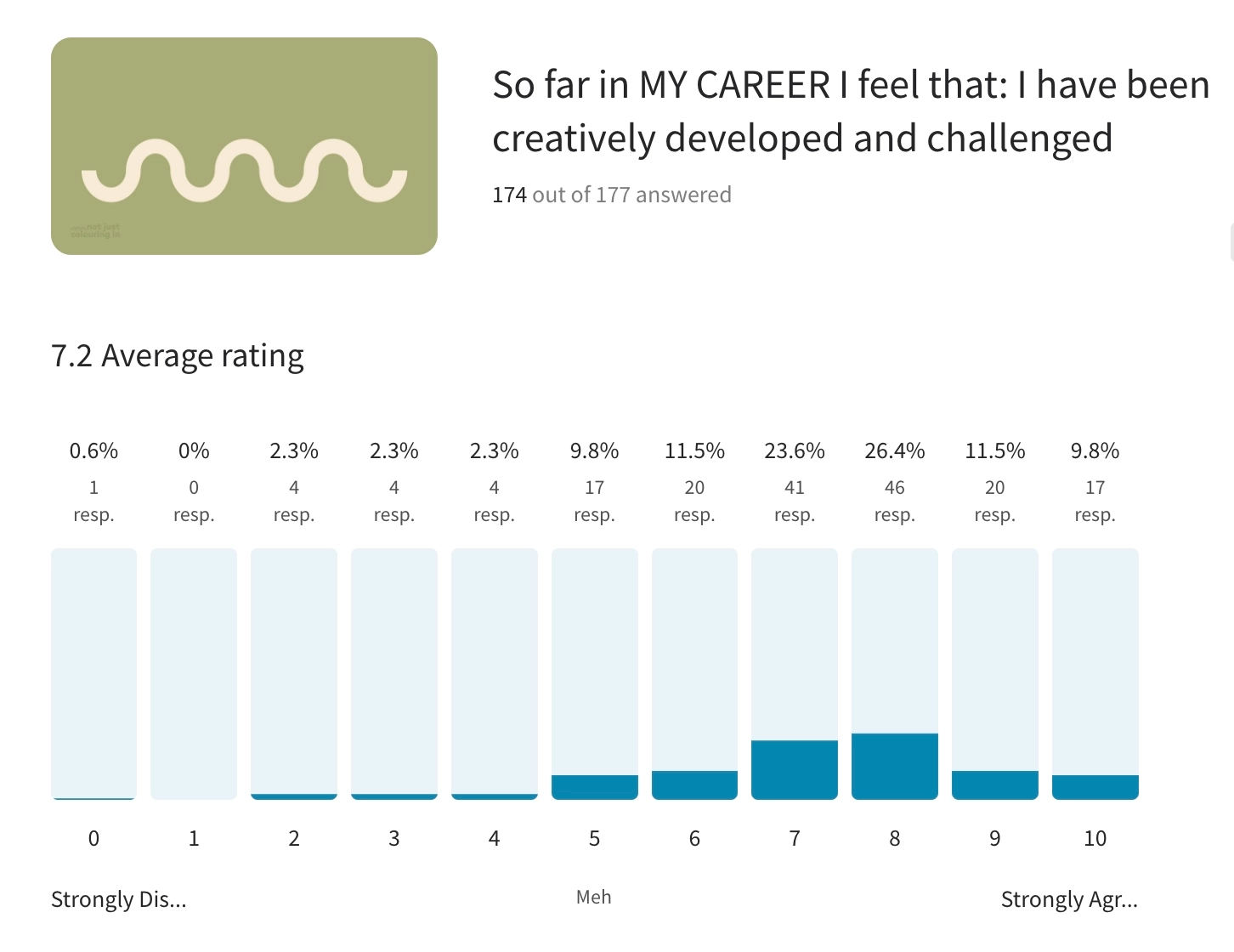NJCI Insights | Creative challenges for growth

TL:DR Creative professionals thrive and maintain engagement when regularly challenged, supported, and given opportunities for growth, as evidenced by positive feedback from the NJCI survey and supported by the Job Demands-Resources Model and the concept of 'flow'.""

Without challenges, we can’t grow. If you’re stuck in your comfort zone for too long, stagnation sets in which leads to boredom and lack of fulfilment. Fresh challenges, with the right support, are essential in developing skills and keeping professionals engaged with their career. Nowhere is this more true than in creative roles. It’s vital for creatives to be stretched to enable them to not only keep up in an ever-evolving industry but become great at what they do. This is where question three of the NJCI survey comes in. We asked licensing professionals; ‘so far in my career I feel that: I have been creatively developed and challenged.’ And you’ll be pleased to hear, the results were positive. Responses averaged out at 7.2 out of 10, which is the highest rating of any question in the NJCI survey. In this article we’ll look at the wider research on professional development, why it’s important and our recommendations for nurturing growth.
Wider research
DEMANDING WORK + PROPER SUPPORT = ENGAGED PEOPLE
To further understand the importance of creative development and challenge we looked at the Job Demands-Resources (JD-R) Model, developed by researchers Arnold Bakker and Evangelia Demerouti in 2006. According to this model, job demands such as a high workload and complex tasks can lead to stress. However, when these demands are balanced with adequate support, feedback, and opportunities for professional development, they result in higher engagement levels. This balance ensures that creative professionals are not only managing their tasks but thriving and growing in their roles.
ABSORPTION + ENJOYMENT x CHALLENGE = FLOW
Going further back, Mihaly Csikszentmihalyi’s concept of ‘flow states’, emphasises the importance of being challenged in one’s work. Csikszentmihalyi, a leading researcher in human creativity, defined flow as a state of deep absorption and enjoyment in work, typically occurring when individuals apply their skills to challenging tasks. This state, often described as being “in the zone,” is characterised by a loss of self-awareness and a sense of timelessness. Regularly experiencing flow leads to better performance, improved mental health, and increased motivation and engagement.
“The best moments in our lives are not the passive, receptive, relaxing times… The best moments usually occur if a person’s body or mind is stretched to its limits in a voluntary effort to accomplish something difficult and worthwhile.” — Mihaly Csikszentmihalyi""
Our survey says
The NJCI survey revealed that most creative professionals in the brand licensing industry feel they have been developed and challenged in their careers. This positive finding indicates that the industry largely supports the creative growth of its professionals, providing an environment where they can thrive and excel.
Recommendations for nurturing growth
Despite the positive findings, there is always room for improvement in fostering creative development and challenge. Leaders in the industry should consider the following recommendations to enhance their support for creative professionals:
Match Projects with Individual Aspirations. Whilst it’s important to assign the best person for a job, it’s also crucial you are developing the skills of each individual team member, without any cost to the client. There are a couple of ways we do this at Skew. Firstly, if the project allows, we build in more time for designers to master a new skill for a project. Secondly, each designer has an Innovation Project that is undertaken alongside their client work. These projects are selected by the designer to focus on an area they are interested in learning more about, for example AI, product manufacture etc. This personalised approach ensures that individuals are both challenged, motivated and growing their skill set.
Provide Clear Guidelines, Training, and Resources. Equip creative professionals with the necessary resources and support systems. Clear guidelines and continuous training opportunities help them navigate complex tasks effectively. Skew’s team is actively encouraged to bring new technologies to the table in monthly meetings. We’ll discuss the practical applications for the new technology and assess whether it is something we can introduce into our workflow.
Offer High-Quality Feedback. High-quality is key here, vague critiques are a designer's worst nightmare so we’re leaving ‘just make it pop’ at the door. For professional growth, constructive and timely feedback is essential. Leaders should ensure that feedback is specific, actionable, and geared towards development.
Fostering creative development and providing challenges for professionals in the licensing and brand extension industry are essential for keeping the workforce engaged and motivated. By balancing demanding work with proper support and opportunities for growth, leaders can promote an environment where creative professionals thrive. The insights from the Not Just Colouring In report serve as a valuable guide for enhancing creative development practices, ultimately leading to a more dynamic and successful industry.
Creative leads:
You are not just colouring in if … you are regularly providing challenging projects paired with strong support to ensure team members stay engaged and motivated.
Creative professionals:
You are not just colouring in if … you are identifying and requesting challenging tasks that provide opportunities for professional growth.
Want to be part of NJCI?
NJCI is all about changing the narrative. You’ve told us that your goal is to transform the way creative departments are viewed — from being seen as a cost burden to being acknowledged and celebrated as essential profit drivers. The 2024 NJCI report marks the beginning of that journey.
Recognising and appreciating the impact of creatives in brand licensing is vital for fueling innovation and achieving success in the industry. Our aim is to equip creative teams with the tools to secure a meaningful place in industry decision-making and help shape its future.
Become part of NJCI by signing up here and get immediate access to the report. It's filled with valuable insights from creatives in licensing and Skew's forward-thinking recommendations.





